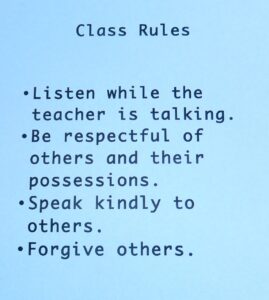 Once you have committed to holding your students accountable for appropriate behavior while they are in your Bible class, the next question becomes what is appropriate? Often what adults expect from children’s behavior is far less than they are capable of doing.
Once you have committed to holding your students accountable for appropriate behavior while they are in your Bible class, the next question becomes what is appropriate? Often what adults expect from children’s behavior is far less than they are capable of doing.
After researching several experts, I compiled this list of behaviors all of them seem to agree upon as reasonable expectations. Do note however, that if the parents of your students don’t expect these behaviors from them at home, it may take several weeks or even months before your students will be able to do these things consistently. Also, children who are developmentally delayed may struggle more and those who are advanced for their age, may be able to exhibit behaviors expected of older children. In general though, most of your students should be able to meet these expectations.
Preschool
- Students should be able to sit still and pay attention to a lesson, story or activity for about fifteen minutes.
- Students should be able to walk in a somewhat straight line, keeping their hands to themselves with some large gaps between students.
- Students should be able to help clean up the classroom with some direction – placing things in bins or drawers, etc.
- Gross motor skills like walking and running should be mostly mastered. More advanced gross motor skills, like skipping and galloping, will have been mastered by some and not at all by others.
- Fine motor skills are in their beginning stages. Most will be able to hold pencils and crayons properly. Some may begin attempting to write letters or numbers. Scissor use may be inconsistent, but improve over time. Students should be able to glue using glue sticks.
- Students should be able to follow simple two-step instructions. Ex: Please close your books and put them in the bin.
- Students should be able to share and take turns with few reminders.
Kindergarten
- Students should be able to sit still and pay attention to a lesson, story or activity for about thirty minutes.
- Students should be able to walk in a straight line without constant reminders to keep hands to themselves or stay close to each other.
- Students should be able to help clean up the classroom with little direction.
- Students should be able to perform the gross motor skills needed to move around the church building or playground. There may still be accidents when focus is distracted or after a recent growth spurt.
- Fine motor skills should be improving. Students should be able to handle small items like craft supplies with little assistance. Some students may still be struggling with shoelaces, zippers and buttons, while others will have mastered these skills.
- Students should be able to follow directions with multiple steps.
- Students can be expected to share and take turns without having to be reminded.
Elementary
Students should be able to sit still and pay attention for increasingly longer periods of time. They should be independent in almost every skill needed in the classroom. Students should also begin showing the ability to self-start in activities like cleaning up when the first bell rings.
Remember, expecting your students to behave in class is also teaching them about the obedience God expects from them. It is an important building block of faith you can begin reinforcing in your classroom.




